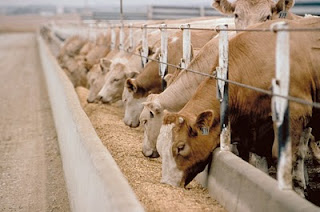
Chinese scientists at the Chinese Academy of Agricultural Sciences (CAAS) have successfully developed a genetically modified (GM) corn that could help enhance the nutritional value of livestock feed and reduce environmental footprints caused by the livestock industry.
This corn called the “Phytase Corn” is a result of the insertion of a gene from a fungus, Aspergillus. It is a known fact that 80% of the phosphorus in corn is in the form of phytate which can easily chelate with minerals and protein to form phytin. Phytate or phytic acid is the main form of phosphorus in plant-based animal feed. But due to lack of phytase (an enzyme capable of digesting phytic acid) in animals, phosphorus in the feed is poorly available to the animals. This deprives the animals of phosphorus which is essential for growth. Furthermore, fecal phosphorus leads to major environmental pollution. Fertilizers produced from animal manure also contribute to environmental pollution due to excessive amount of phytic acid.
China alone produces 2.5 million tons of fecal phosphorus annually. Phytase corn will decrease the excretion of phosphorus in the feces by 40%. This will reduce phosphorus pollution greatly. Phosphorus pollution has caused a widespread of algal bloom in Chinese lakes. Currently it is mandatory to use phytase as an additive for animal feed in countries like Europe, Southeast Asia, South Korea, Japan and Taiwan for environmental purposes. With the introduction of phytase corn, livestock players will not have to buy corn and phytase separately. It is reported that Chinese farmers could save up to US$60 million per year in buying industrial phytase. The worldwide phytase potential market size is US$500 million. It is anticipated that farmers can save time, machinery, and labour cost as phytase corn will eliminate the need for mixing phytase and corn together.
Phytase corn was developed by CAAS after seven years of study and the Ministry of Agriculture has evaluated it for safety and has awarded the Biosafety Certificate to Origin Agritech Limited, a Chinese company located in Beijing. CAAS will license the technology to Origin Agritech Limited for the corn to be commercialised.
CAAS is expecting the product to hit the market in five years time. Will this product be spared of activists' criticism and opposition since it will hugely contribute in reducing negative impact on the environment? Time will tell.
By Mahaletchumy Arujanan

No comments:
Post a Comment